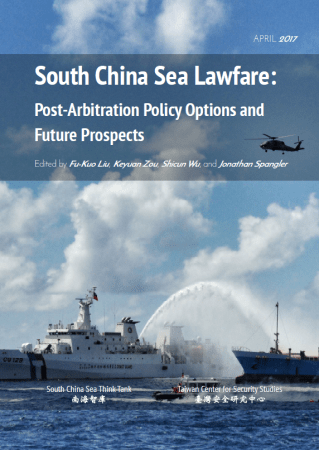- Book Chapter
- Asia-Pacific, Global, South China Sea
Home / Books & Journal Articles / New Report Chapter – Post-Arbitration South China Sea: China’s Legal Policy Obligations and Future Prospects


Executive Director & Senior Fellow
Dr. Hong is the author of a chapter for the newly released report, South China Sea Lawfare: Post-Arbitration Policy Options and Future Prospects. Her chapter, Post Arbitration South China Sea: China’s Legal Policy Options and Future Prospects. The chapter lays out China’s strategic options in the South China Sea in the aftermath of the International Tribunal for the Law of the Sea ruling in 2016.
With the Award being released on July 12, 2016, the South China Sea arbitration case, lasting for more than three years, has come to an end. The Tribunal concluded in its thoroughly one-sided Award that many of China’s maritime claims in the South China Sea were contrary to the United Nations Convention on the Law of the Sea (UNCLOS) and that actions supported by the Chinese government had thereby violated the Philippines’ sovereign rights and freedoms.
In general, China’s legal policy approach to territorial disputes is based on its preference for negotiation and/or consultation directly with the other party, and its position of non-participation in and non-acceptance of the South China Sea arbitration case and its awards has been coherent. The end of the proceedings does not mean the end of the disputes between the two countries and within the region. However, it does have important legal and political implications for China and other states.
That said, the arbitration case has motivated China and ASEAN to speed up negotiations on a Code of Conduct. It has also created an opportunity for both China and the Philippines, which have openly expressed their willingness to engage in bilateral negotiations. These developments also raise important questions about the role that extra-regional actors should play in the disputes. The South China Sea has a complicated past and an uncertain future, but cooperation among nations could stabilize the region and bring tranquility to this important sea.
Report Title: South China Sea Lawfare: Post-Arbitration Policy Options and Future Prospects
Paperback: 231 pages
Publisher: South China Sea Think Tank (April, 2017)
Language: English
ISBN 978-986-92828-2-6 (print)
ISBN: 978-986-92828-3-3 (ebook/pdf)

Executive Director & Senior Fellow
Dr. Nong Hong holds a PhD of interdisciplinary study of international law and international relations from the University of Alberta, Canada and held a Postdoctoral Fellowship in the University’s China Institute. She was ITLOS-Nippon Fellow for International Dispute Settlement (2008-2009), and Visiting Fellow at Australian National Centre for Ocean Resources and Security (2019), the Center of Oceans Law and Policy, University of Virginia (2009) and at the Max Planck Institute for Comparative Public Law and International Law (2007). She is concurrently a research fellow with China Institute, University of Alberta, Canada, and the National Institute for South China Sea Studies, China. Her research takes an interdisciplinary approach to examining international relations and international law, with focus on International Relations and Comparative Politics in general; ocean governance in East Asia and the Arctic; law of the sea; international security, particularly non-traditional security; and international dispute settlement and conflict resolution.

The Institute for China-America Studies is an independent nonprofit, nonpartisan research organization dedicated to strengthening the understanding of U.S.-China relations through expert analysis and practical policy solutions.
1919 M St. NW Suite 310,
Washington, DC 20036
icas@chinaus-icas.org
(202) 968-0595
© 2025 INSTITUTE FOR CHINA-AMERICA STUDIES. ALL RIGHTS RESERVED.
The Nordic Reaction to America’s Arctic Posture